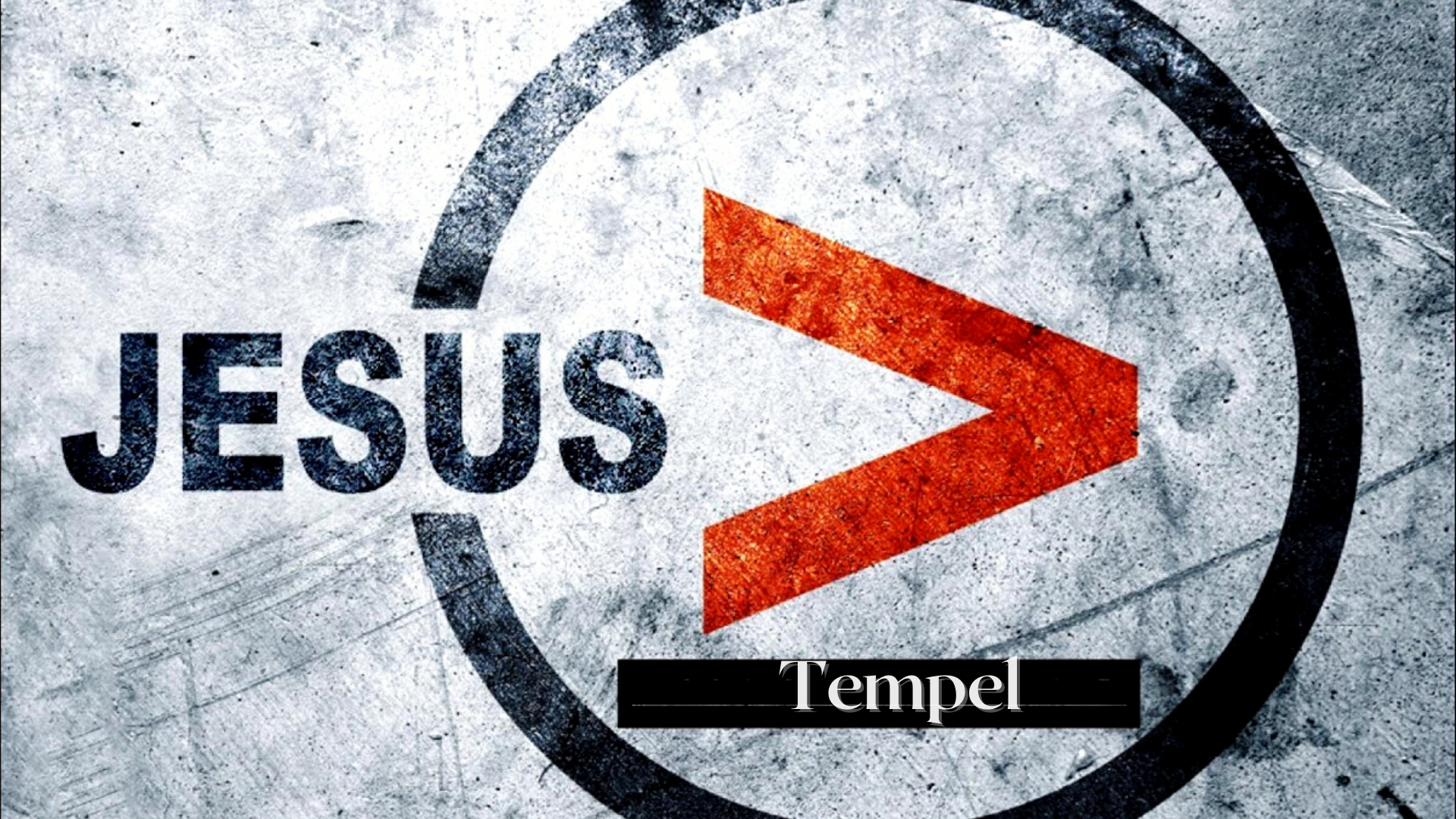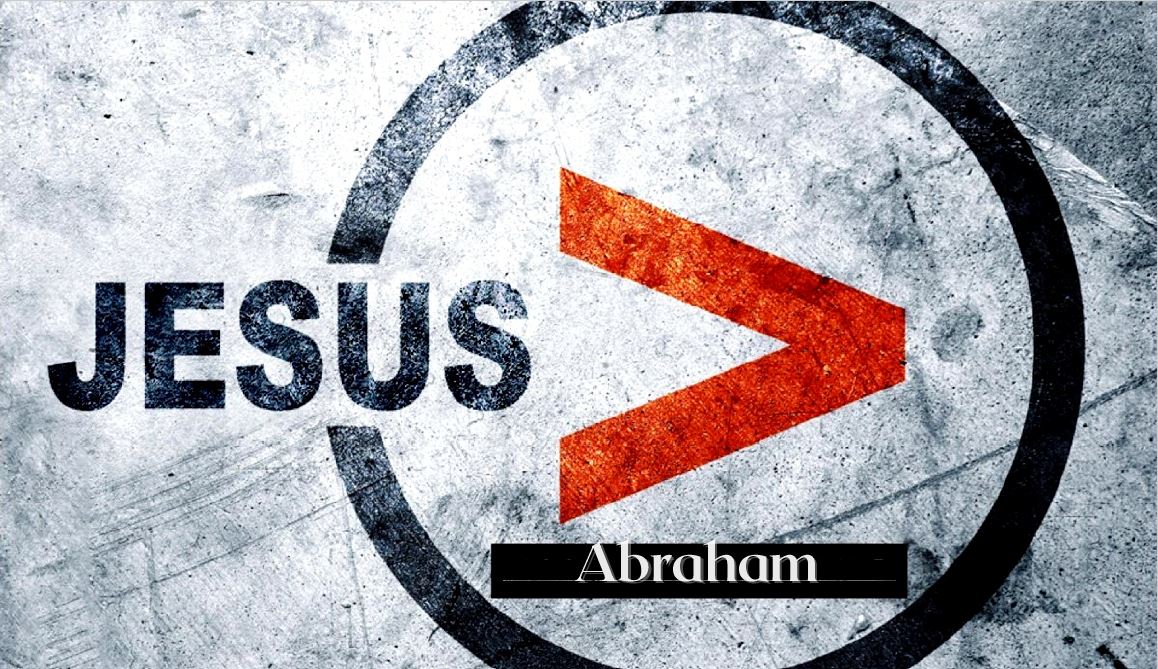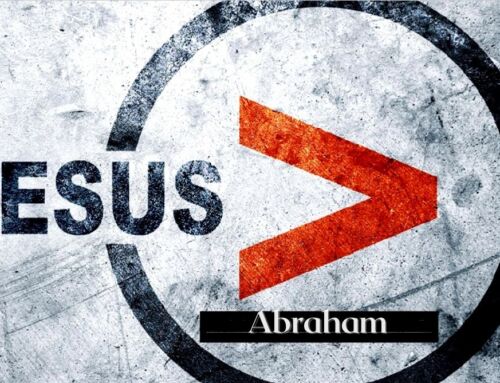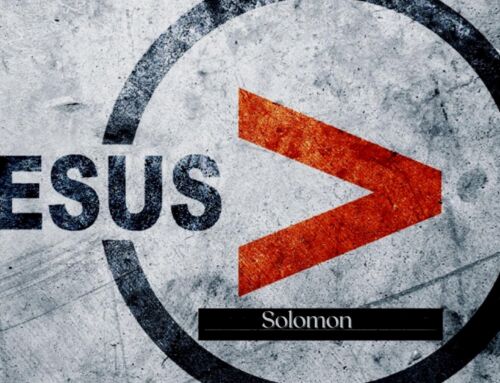Jesus, greater than the temple
Summary:
For Israel, the temple was the meeting place with God—the center of their worship and religious life. It was the only place where sacrifices could be offered and where acceptable worship could take place. But Jesus declares Himself greater than the temple. In the new covenant, God’s presence is no longer bound to a building – it is revealed to us in Jesus. He is the cornerstone of the new temple and we are the living stones being built into a spiritual house. The priests served in the temple temporarily and with weakness. Jesus, the sinless and perfect High Priest, serves forever and is continually interceding for us at God’s right hand. The temple required continual sacrifice. Jesus is the perfect sacrifice who once for all satisfied God’s wrath, so that we may have peace with Him. The Sabbath rituals in the Temple pointed to Jesus as the fulfillment: He is Lord of the Sabbath, the true rest, the bread of life.
Introduction
As we continue in our series called Greater Than, I invite you to open to the Gospel of Matthew, Chapter 12. We will consider verses 1–8 and focusing for our series’ sake on verse 6, where Jesus says that he is greater than the temple:
At that time Jesus went through the grainfields on the Sabbath. And His disciples were hungry, and began to pluck heads of grain and to eat. 2 And when the Pharisees saw it, they said to Him, “Look, Your disciples are doing what is not lawful to do on the Sabbath!” 3 But He said to them, “Have you not read what David did when he was hungry, he and those who were with him: 4 how he entered the house of God and ate the showbread which was not lawful for him to eat, nor for those who were with him, but only for the priests? 5 Or have you not read in the law that on the Sabbath the priests in the temple profane the Sabbath, and are blameless? 6 Yet I say to you that in this place there is One greater than the temple. 7 But if you had known what this means, ‘I desire mercy and not sacrifice,’ you would not have condemned the guiltless. 8 For the Son of Man is Lord even of the Sabbath. (Matthew 12, 1-8)
The temple was a place of national identity. It symbolized Israel’s security. It was the place where they met with God and they said the only acceptable worship could take place. Therefore, it is a strong and striking statement when Jesus says, “One greater than the temple is here,” in the grain fields.
Jesus’ Invitation into Eternal Fellowship
Before we explore what Jesus means in that statement, I want us to understand the broader context of the passage that Matthew is giving. In verse 1, he says “at that time”—that points us back to what has been going on before. In Chapter 11, Jesus affirms to the disciples that he is the Messiah, just as John the Baptist said. More closely, at the end of Chapter 11, there is an astonishing statement. If there were two themes at the end of Chapter 11, they would be revelation and rest. You see this because Jesus speaks of things being hidden from some and revealed to others. In verse 27, he says,
no one knows the Son except the Father. Nor does anyone know the Father except the Son, and the one to whom the Son wills to reveal Him.
From all eternity, in the community of the Triune God, the Son and the Father have been in perfect fellowship. This eternal, intimate fellowship they have shared is what Jesus now begins to invite you to experience.
The only knowledge of God comes through knowing Jesus, for nobody can know God unless they know Jesus, and Jesus is the only one who knows the Father. All knowledge of God can only come through the Lord Jesus Christ.
That which was from the beginning, which we have heard, which we have seen with our eyes, […] that you also may have fellowship with us; and truly our fellowship is with the Father and with His Son Jesus Christ. (1 John 1:1-3)
In 1 John, the apostle says: what was from the beginning—what we have seen with our eyes and heard—we proclaim to you, and truly our fellowship is with the Son, and we invite you into this fellowship.
From Burden to Blessing: Finding Rest in Jesus
Knowledge of God and the fellowship of God’s people comes through Jesus extending to you the fellowship of the Triune God. On one hand, Jesus reveals the Father to people; on the other, Jesus speak of rest. That is why Jesus says in verse 28,
Come to Me, all you who labor and are heavy laden, and I will give you rest. (Matthew 11, 28)
The claim to give rest is entirely a divine prerogative—here Jesus is claiming to be God. He is the giver of the Sabbath and the Sabbath itself—the true rest.
From this point Matthew is dealing with the idea of the Sabbath. Notice that Jesus says:
I am gentle and lowly in heart. (Matthew 11, 29)
When Jesus speaks of you being heavy laden, it may refer to the burdens the religious leaders and Pharisees have laid upon people. They placed heavy loads on others, but Jesus says in verse 29,
Take My yoke upon you and learn from Me, for I am gentle and lowly in heart, and you will find rest for your souls. (Matthew 11, 29)
This stands in direct contrast to the Pharisees, who failed to be gentle and lowly and instead burdened the people.
Relationship Over Rules
If you come to Jesus, you will find gentleness, lowliness, and true rest for your soul. When you come to Jesus, it is not about rules—it is about a relationship. That is why Jesus says, “If you know Me, you know the Father.”
It is not about your ability to perform and keep all the little rules.
This does not mean you can live however you want—that would be antinomianism, the idea that grace allows you to disregard God’s commands. The Bible teaches that where grace is truly in your heart, it will be shown in the way you live. So when I say it is about a relationship, not rules, I am not saying you may do as you please. It is a relationship not based on your perfect rule-keeping, but on the fact that Jesus has fulfilled the law in your place.
Why Many Believers Still Miss God’s Rest
But as we look around right now, we might not be marked by rest, but rather by stress, fear, and panic. Jesus invites you to the rest that he has provided for you in his work of redemption on your behalf.
I ask you very directly: are you in that rest that Jesus is speaking of? Have you entered into that rest? One of the saddest things to see is a Christian who hasn’t yet fully understood the concept of God’s grace in the Lord Jesus Christ. And therefore, life isn’t marked by rest. It’s very easy for us to not live in rest, but rather to live a works-based relationship with God. It happens very easily, and sadly, it sometimes happens in the realm of our Christian disciplines.
Our disciplines and our pursuit of holiness can become the way we think we are right with God. You might think, “I didn’t read my Bible today, so there’s no way I could expect that God’s going to do anything good for me today. I tried to pray, but I was so distracted, I ended up on my phone, so surely God’s favor or joy over my life can’t be real today.” This finds its way into how you come to church on a Sunday.
On one hand, you might say, “This week I was up early every day, I prayed every day, I read every day — this Sunday is going to be the most amazing Sunday.” Now, granted, these things will produce more energy and anticipation in meeting with God’s people, but it is not the basis on which God intends to bless you.
On the other hand, you might say, “This week was horrible. I slept in every day. I yelled at my wife. I kicked the dog. I lied to my neighbor. Sunday… God has nothing good for me.” I’m not advocating yelling at your wife, kicking your dog, or cussing at your neighbor. But I am saying that the basis of your standing before God rests solely in the redemptive achievements of the Lord Jesus Christ.
Finding True Rest in the Forgiveness and Grace of Jesus
It is a wonderful thing when, as a Christian, you rest in the fullness of God’s forgiveness and in the grace of his Son. For that is the only true place you will find the rest for your soul that you constantly and desperately need. This is a marvelous invitation, and when you enter into it, the benefits are marvelous as well.
Before we move on, I ask you once again: do you have it? Are you living it?
The Wrong Spirit of the Pharisees
As we continue, in verse 2 we see an accusation. But first, in verse 1, it’s actually a nice little scene — walking through the grain fields on the Sabbath, maybe after synagogue, going for a nice stroll, enjoying each other’s company. They’re out there, socially distancing, I’m sure — because the Pharisees are watching. They’re plucking grain, eating it, just having a nice day. This was actually allowed in the Law; there was nothing illegal about it.
But in verse 2, the Pharisees see it and accuse the disciples of doing what is not lawful.
Nobody knows the Son except the Father, and nobody knows the Father except the Son, and the one to whom the Son wills to reveal Him.
From all eternity, in the community of the Triune God, the Son and the Father have been in perfect fellowship. This eternal, intimate fellowship they have shared is what Jesus now begins to invite you to experience.
My first question is — what were the Pharisees doing there? Everywhere Jesus goes, they pop up, ready to accuse him of something. You get the idea they’re stalking him, following him everywhere he goes — not as true followers, but in the wrong spirit.
You get this idea that they’re stalking Jesus, following Him everywhere that He is going. It’s not our follower, it’s just not in the right way. And there they are, finding a way to be wherever Jesus is. They’re watching, and they’re waiting to find things that they can accuse Him with. And it’s creepy, isn’t it, that they’re just always there, watching, always being around Him with ill intentions.
Satan’s Scheme: Seeking Grounds for Condemnation
It reminds you of Daniel as he went about, and they were setting this trap—see if he’s going to pray or not. And the whole goal was to find something by which they could accuse him of wrongdoing. You know, isn’t that exactly what the enemy does now? It’s no mistake that Satan is called “the accuser of the brethren.” He loves to accuse us, doesn’t he? He loves to accuse us in the public square.
Now this is a strong accusation that the Pharisees are bringing to Jesus. It’s not an observation—they are accusing Him of something wrong. And since Jesus is the rabbi, they go to Him. But notice, they don’t care about the disciples—they care about discrediting Jesus. They say: “These are your guys. They’re breaking the law. It’s not an accident that they’re doing it, and you are approving of it.”
And Jesus, whoever stands in our defense stands in their defense. Now we have an answer as He begins to answer them—from Scripture as well as His own authority. Because Scripture and the authority of the person of Jesus will always testify to each other. And you’ll notice that in each of the examples we see, the Tabernacle and the Temple are the point of reference for Jesus.
Jesus Confronts Misapplied Law: The Sabbath Made for Man
So we come to the first example—David. He says, “Haven’t you read?” You guys are the scholars here, right? Don’t you know the Book? That David, as he was fleeing from Saul, ate the showbread—as well as his friends—even though it wasn’t lawful because the showbread was for the priests. So what’s the deal with that? You have a problem, because if you look at the Old Testament and the strict application of the law, you see instances where there’s another principle at work. Therefore, their strict application had gone too far, and it created a problem for them. Either they had to say that David was wrong, or that he was right.
Now on top of that, the whole accusation about Jesus’s disciples was unfounded—they didn’t actually break the law. It’s not like Bartholomew went and told somebody, “Give me your horse. The Lord has need of it.” And then tied up all the farming equipment, began to work, began to harvest, began to do all those things that are involved in making bread and working. He didn’t do that—just took a little grain and put it in their mouth. They weren’t entering into what the Torah would describe as real work on the Sabbath.
So He says to the Pharisees concerning David, “Either David was wrong or he was right.” But David was hungry, and they’re hungry. “The Sabbath was made for man, not man for the Sabbath.” Therefore, human need is still recognized, and that is the spirit of the law.
How Good Intentions Can Lead to Pharisee-Like Legalism
Now listen—none of this negates the law at all. That’s not what Jesus is doing. He comes to fulfill the law. And we may apply this to ourselves: we could become so focused on all of the rules—rules built upon stacks and stacks of rules—that we become just like the Pharisees.
This is particularly true sometimes in the life of a church. Sometimes person A doesn’t like event A, and they say, “I don’t think that really matches what we should be doing. It’s not biblical.” People all have their opinions. Or we have a problem, and to fix it, even though it’s just one instance, we create an entirely new set of rules. The next thing you know, we lose the liberty of walking in the Spirit because we keep setting up rules to avoid uncomfortable situations.
That is precisely how the Pharisees became who they were—they added rules in order to protect disobedience from happening. And then Jesus provides the example of the priests: They work on the Sabbath because that is their God-given duty—offering sacrifices. It is the spirit of the law that Jesus is addressing.
One Greater Than the Temple: Mercy Over Sacrifice
Jesus says in verse 6,
Yet I say to you, in this place there is one greater than the temple.
If such provisions could be allowed in the temple, they could certainly be allowed here because He is here, and He is greater than the temple. Jesus is the Son of David, David’s greater Son, the one who reigns on the throne. This puts the Pharisees in the place of Saul, pursuing David, and the disciples in the place of David’s companions, lawfully eating the showbread.
When Jesus says one greater than the temple is here, He is declaring Himself the true temple. The disciples are acting lawfully, like priests, because the true temple is among them. Then Jesus says,
I desire mercy and not sacrifice
if you had understood this, you would not have condemned the guiltless.
You can do everything right according to the sacrificial system and still fail if you lack compassion toward those in need. God desires mercy.
This is not permission to live without accountability; rather, it shows that the compassionate heart of God must shape all our obedience to His Word. These men were hungry—was it merciful to stop them from eating?
Then Jesus says, “The Son of Man is Lord of the Sabbath.” I am the one who gave the Sabbath, therefore I am God. Because I give it, I make the rules, and you cannot challenge Me. If I allow them to do this, it is acceptable to God. Jesus moves from a Scriptural argument to one of His own divine authority: I am Lord over this day; they can do this because I allow them.
Jesus moves from a scriptural argument to asserting His divine authority. Returning to verse 6—“there is one greater than the temple”—the temple was the place where God dwelt with His people, the center of life socially, religiously, and politically. It was where sacrifice and worship happened, where you had to go to meet with God. But Jesus is the greater, truer temple. As John says, “The Word became flesh and tabernacled among us.” He dwelt among us. The earthly tabernacle was only a copy and shadow of the heavenly one.
One Greater Than the Temple: Jesus
The temple was Israels meeting place with God – but in the new covenant that place is not a building, it is a person. In Jesus, God Himself has come to dwell among us. Jesus told the Jewish leaders,
“Destroy this temple, and in three days I will raise it up” (John 2:19).
John clarifies He was speaking about His body. John writes,
“I saw no temple in the city, for its temple is the Lord God the Almighty and the Lamb.” (Revelation 21:22)
In eternity, God’s presence is fully and directly with His people—no building needed. And unlike the temple, in Christ there is no curtain, no separation, no barrier. Through Him the way to the Father stands wide open.
You don’t need to travel to a holy place to meet with God — you only need to come to Christ. You don’t need to depend on human priests — for He is your eternal High Priest (Hebrews 4:14; 7:23–28). You don’t need to bring animal sacrifices to cover your sins — because Jesus has already given Himself as the perfect, once-for-all offering (Hebrews 9–10). In Him, God’s wrath is satisfied, you can have peace with God, and your soul can finally find lasting rest.
And you don’t need to strive to earn God’s favor — for Christ Himself is your Sabbath rest. So come to Him. Trust Him. Rest in Him. For truly, One greater than the temple is here — and He is here for you.







